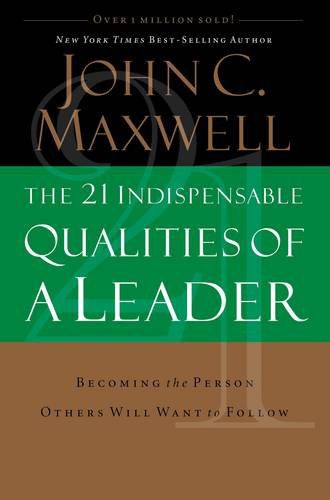Leadership author John C. Maxwell writes a complementary companion to his book, The 21 Irrefutable Laws of Leadership. In The 21 Indispensable Qualities of a Leader: Becoming the Person Others Will Want to Follow, John highlights twenty-one essential leadership qualities and include “Reflecting On It” and “Bringing It Home” sections that help readers integrate and apply each day’s material.
According to John C. Maxwell, the 21 Indispensable Qualities of a Leader are the following :
1 CHARACTER: Be a Piece of the Rock
2 CHARISMA: The First Impression Can Seal the Deal
3 COMMITMENT: It Separates Doers from Dreamers
4 COMMUNICATION: Without It You Travel Alone
5 COMPETENCE: If You Build It, They Will Come
6 COURAGE: One Person with Courage Is a Majority
7 DISCERNMENT: Put an End to Unsolved Mysteries
8 FOCUS: The Sharper It Is, the Sharper You Are
9 GENEROSITY: Your Candle Loses Nothing When It Lights Another
10 INITIATIVE: You Won’t Leave Home Without It
11 LISTENING: To Connect with Their Hearts, Use Your Ears
12 PASSION: Take This Life and Love It
13 POSITIVE ATTITUDE: If You Believe You Can, You Can
14 PROBLEM SOLVING: You Can’t Let Your Problems Be a Problem
15 RELATIONSHIPS: If You Get Along, They’ll Go Along
16 RESPONSIBILITY: If You Won’t Carry the Ball, You Can’t Lead the Team
17 SECURITY: Competence Never Compensates for Insecurity
18 SELF-DISCIPLINE: The First Person You Lead Is You
19 SERVANTHOOD: To Get Ahead, Put Others First
20 TEACHABILITY: To Keep Leading, Keep Learning
21 VISION: You Can Seize Only What You Can See
